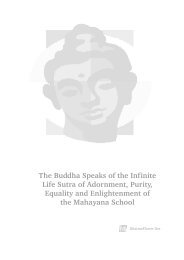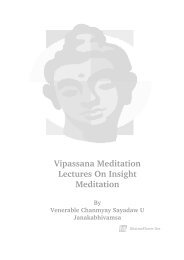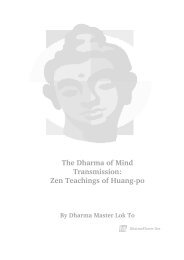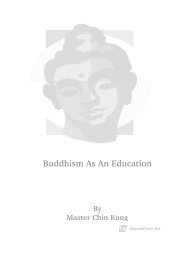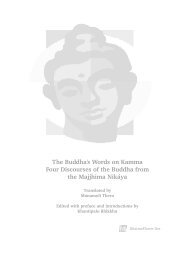THE FOUR NOBLE TRUTHS By Ajahn Sumedho - DharmaFlower.Net
THE FOUR NOBLE TRUTHS By Ajahn Sumedho - DharmaFlower.Net
THE FOUR NOBLE TRUTHS By Ajahn Sumedho - DharmaFlower.Net
You also want an ePaper? Increase the reach of your titles
YUMPU automatically turns print PDFs into web optimized ePapers that Google loves.
We can investigate: Where has this hedonistic seeking of pleasure asan end in itself brought us? It has continued now for several decadesbut is humanity any happier as a result? It seems that nowadays wehave been given the right and freedom to do anything we like withdrugs, sex, travel and so on - anything goes; anything is allowed;nothing is forbidden. You have to do something really obscene, reallyviolent, before you’ll be ostracised. But has being able to follow ourimpulses made us any happier or more relaxed and contented? Infact, it has tended to make us very selfish; we don’t think about howour actions might affect others. We tend to think only about ourselves:me and my happiness, my freedom and my rights. So I become aterrible nuisance, a source of great frustration, annoyance and miseryfor the people around me. If I think I can do anything I want or sayanything I feel like saying, even at the expense of others, then I’m aperson who is nothing but a nuisance to society.When the sense of ‘what I want’ and ‘what I think should and shouldnot be’ arises, and we wish to delight in all the pleasures of life, weinevitably get upset because life seems so hopeless and everythingseems to go wrong. We just get whirled about by life - just runningaround in states of fear and desire. And even when we get everythingwe want, we will think there is something missing, somethingincomplete yet. So even when life is at its best, there is still this senseof suffering - something yet to be done, some kind of doubt or fearhaunting us.For example, I’ve always liked beautiful scenery. Once during a retreatthat I led in Switzerland, I was taken to some beautiful mountains andnoticed that there was always a sense of anguish in my mind becausethere was so much beauty, a continual flow of beautiful sights. I hadthe feeling of wanting to hold on to everything, that I had to keep alertall the time in order to consume everything with my eyes. It was reallywearing me out! Now that was dukkha, wasn’t it?I find that if I do things heedlessly - even something quite harmlesslike looking at beautiful mountains - if I’m just reaching out andtrying to hold on to something, it always brings an unpleasant feeling.How can you hold on to the Jungfrau and the Eiger? The best you cando is to take a picture of it, trying to capture everything on a piece ofpaper. That’s dukkha; if you want to hold on to something which isbeautiful because you don’t want to be separated from it - that issuffering.Having to be in situations you don’t like is also suffering. For example,I never liked riding in the Underground in London. I’d complain aboutit: ‘I don’t want to go on the underground with those awful postersand dingy Underground stations. I don’t want to be packed into thoselittle trains under the ground.’ I found it a totally unpleasantexperience. But I’d listen to this complaining, moaning voice - the



